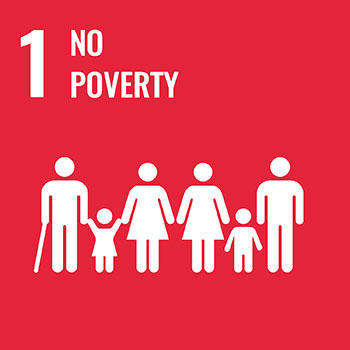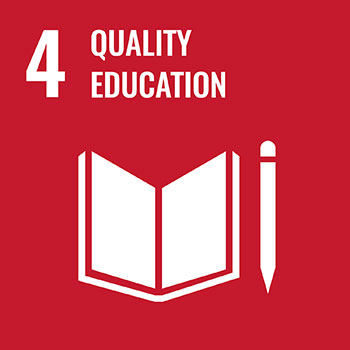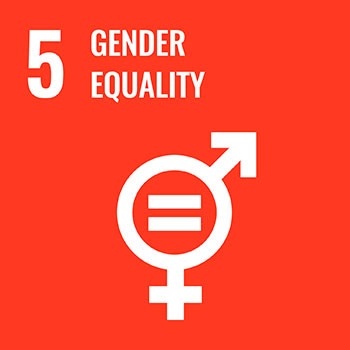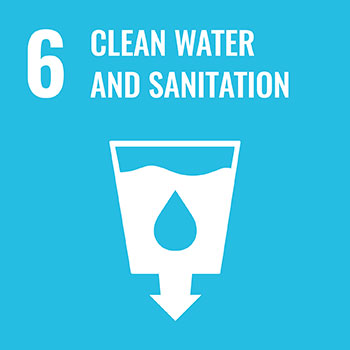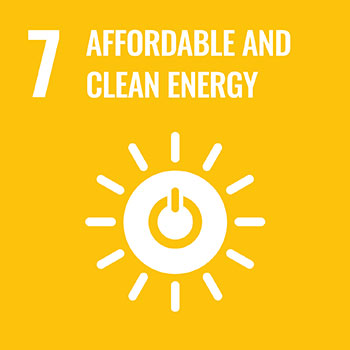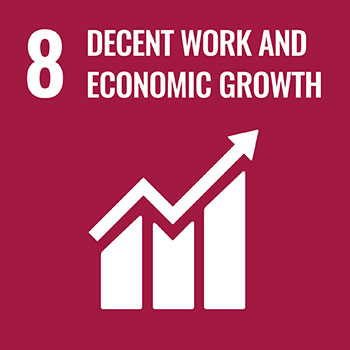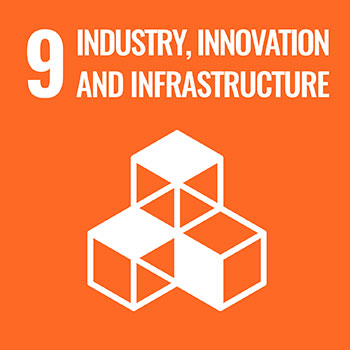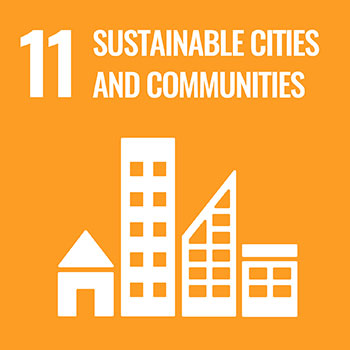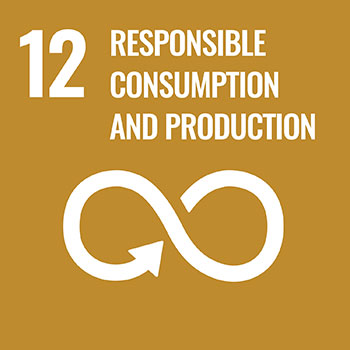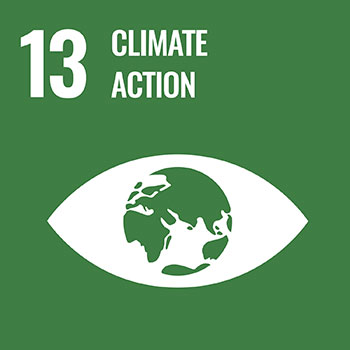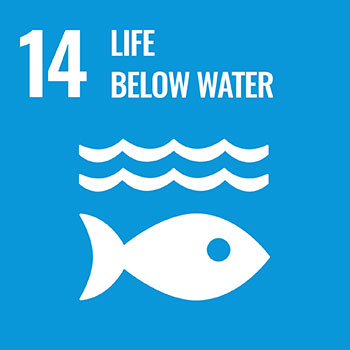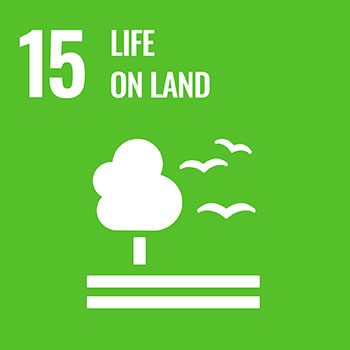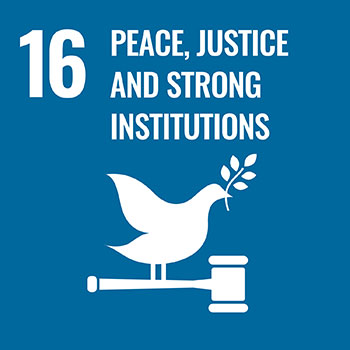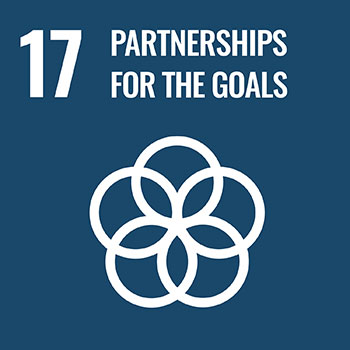Search for academic programs, residence, tours and events and more.
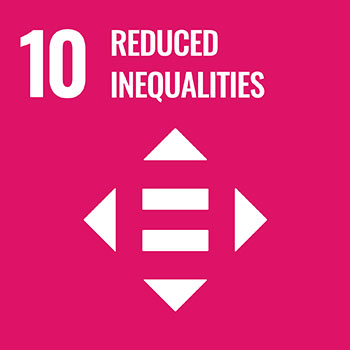
Reduce inequality within and among countries.
Wilfrid Laurier University is committed to creating a culture of inclusion where our community feels accepted and can experience a powerful sense of belonging. To advance SDG 10, we strive to provide barrier-free, welcoming and affirming learning and working environments and engage in activities that enable all people to fully participate in every aspect of day-to-day life at the university and beyond.
The work that Laurier completed in 2024 to advance SDG 10.
Ciann Wilson, an associate professor of Psychology at Wilfrid Laurier University, has been named the Canada Research Chair in Community-Based Research, Ethics and Well-being in recognition of her impactful research with and alongside equity-deserving communities. The Canada Research Chair Program is also honouring Wilson with its prestigious Robbins-Ollivier Award for Excellence in Equity.
CIBC is generously supporting the creation of two new student awards to help foster the success of equity-deserving students at Wilfrid Laurier University and help build the foundation for Laurier’s new Milton campus, while also encouraging the study of science, technology, engineering and math (STEM).
The Sun Life Centre for Healthy Communities at Wilfrid Laurier University is delivering the MLSE House of Hockey ball hockey program to 40 Kitchener-Waterloo area youth as part of its summer programming, introducing the game to some for the very first time.
Arriving from the small Ontario community of Port Elgin, Oliver Manidoka was naturally a little nervous when beginning studies at Wilfrid Laurier University’s Waterloo campus as a first-year undergraduate student.After four successful years, Manidoka will graduate at spring convocation this June with a Bachelor of Arts in Psychology, research specialist designation. During his undergraduate studies, Manidoka has experienced Indigenous Student Services as both a student and staff member.
Earning a university degree is never easy, but thanks to hard work, encouragement from family members and support from Laurier’s Indigenous Student Services team sisters Eliza and Delaney Thomas will proudly cross the convocation stage at Laurier’s Brantford campus in June.
If your child approaches you with a grim look on their face and says in a low tone of voice, “Mom, I have something to tell you,” you might assume that they have cancer or committed a crime. You would likely prepare yourself for bad news. If the “something” turns out to be “I’m gay,” the ominous delivery would frame that disclosure in a negative light. After analyzing hours of real-life recordings of “coming out” conversations, Wilfrid Laurier University researcher Jeffrey Aguinaldo confirms that this is the prototypical approach.
Wilfrid Laurier University has appointed Andrea Davis as the new associate vice-president: equity, diversity and inclusion (AVP: EDI) for a five-year term beginning August 1. Davis joins Laurier from York University, where she served as a distinguished faculty member and chair in the Department of Humanities. Leading a transformative vision of interdisciplinary teaching and research, she is the founder and program coordinator of the Black Canadian Studies Certificate and was the academic convenor of the 2023 Congress of the Humanities and Social Sciences.
Live music, applause and cheers filled the air at Wilfrid Laurier University’s Waterloo campus as more than 200 Black Waterloo Region District School Board (WRDSB) students in Grades 5 through 8 celebrated their identities, heritage and futures during the Black Brilliance conference.
From mentorship programs and culturally relevant curriculum to dedicated support centres and student groups, postsecondary institutions across Canada are working to create equitable and inclusive environments for Black and racialized students.
Laurier research centres advancing SDG 10.
The International Migration Research Centre (IMRC) serves as a node of excellence in scholarship and research, social and cultural debate, and policy formulation pertaining to international migration. The IMRC's mission is to create platforms for debate, research, policy analysis, community engagement and proposal development related to international migration and mobility at global, national, regional and local scales.
The Centre for Community Research, Learning and Action (CCRLA) is an interdisciplinary research centre located in Laurier’s Faculty of Science. The centre's work is focused on developing community partnerships and producing research, learning and action that advances community well-being and social justice. CCRLA facilitates community-based research by brokering linkages between community partners and Laurier student and faculty researchers. CCRLA provides an activity centre for social policy development and community action. The defining feature of the centre is its commitment to collaborative processes between university, community, industry and policy partners that honour the unique wisdom and skills of the non-academic community.
Laurier initiatives in 2024 that advanced SDG 10.
Laurier tracks both applications and admissions of all applicant groups, including those who are underrepresented. Some indicators are publicly reported through Common University Data Ontario and Laurier’s Registrar’s Reports.
Laurier is a thriving academic community where EDI and Indigeneity are part of our core values as a learning institution. Laurier’s Strategic Action Plan and Academic Plan include commitment to diversify its student body and increase representation of students historically underrepresented on campus. Laurier’s EDI Strategic Plan highlights Laurier’s use of an EDI Data Specialist to collect, analyze and track demographic student data, including data on student applicants. The EDI Data Specialist develops and implement plans to address differential outcomes identified through data analysis with a view to identifying and reducing barriers to student success and wellness, including funding, bursaries and scholarships for students and student-athletes from equity-deserving groups.
|
Age |
2021 |
2022 |
2023 |
2024 |
|---|---|---|---|---|
|
17 and Under |
|
|
|
|
|
18 |
|
|
|
|
|
19 |
|
|
|
|
|
20 |
|
|
|
|
|
21 |
|
|
|
|
|
22 |
|
|
|
|
|
23 |
|
|
|
|
|
24 |
|
|
|
|
|
25-26 |
|
|
|
|
|
27-29 |
|
|
|
|
|
30 and Over |
|
|
|
|
|
Total |
|
|
|
|
|
Gender Identity |
2021 |
2022 |
2023 |
2024 |
|---|---|---|---|---|
|
Female |
|
|
|
|
|
Male |
|
|
|
|
|
Another Identity |
|
|
|
|
|
Total |
|
|
|
|
|
Parents/Guardians Attended University/College? |
2021 |
2022 |
2023 |
2024 |
|---|---|---|---|---|
|
Yes |
|
|
|
|
|
No |
|
|
|
|
|
Not Reported |
|
|
|
|
|
Total |
|
|
|
|
|
Citizenship |
2021 |
2022 |
2023 |
2024 |
|---|---|---|---|---|
|
Domestic |
|
|
|
|
|
International |
|
|
|
|
|
Total |
|
|
|
|
|
First Language |
2021 |
2022 |
2023 |
2024 |
|---|---|---|---|---|
|
English |
|
|
|
|
|
French |
|
|
|
|
|
Other |
|
|
|
|
|
Total |
|
|
|
|
|
Educational Source |
2021 |
2022 |
2023 |
2024 |
|---|---|---|---|---|
|
Direct Applicant |
|
|
|
|
|
High School Applicant (OUAC 101) |
|
|
|
|
|
Part-Time Applicant |
|
|
|
|
|
Regular Applicant (OUAC 105) |
|
|
|
|
|
Total |
|
|
|
|
The Laurier Strategy sets the mission for the institution that is guided by two distinct strategic themes: thriving community and future-readiness. As part of the thriving community theme, Laurier recognizes the importance of creating an inclusive community. Laurier excels at creating a culture of engagement that develops the whole person and builds reciprocal community relationships by fostering a highly personalized, equitable, diverse and inclusive community in which all members can experience the powerful sense of belonging that has distinguished Laurier throughout its history. The institution also seeks to integrate Indigenous knowledge and practices across the university.
By embracing the values of EDI, Laurier will be better equipped to attract, retain and advance the kind of talented staff, students and faculty who will move the university forward in new and exciting ways. To enhance the diversity of our community, Laurier has developed the following initiatives:
Laurier is home to a number of committees, leaders and offices dedicated to the advancement of equity, diversity, inclusion and human rights on campus. These include:
Laurier is committed to ensuring the success of all member of our community, including historically underrepresented groups. A number of initiatives have been put in place, including:
Laurier is building a more accessible built environment by embedding accessibility into our foundational plans. This includes the Accessibility Plan, Capital Plan, Campus Master Plan, Landscape Master Plan, Signage Guidelines and Parking Plan. Through the Rick Hansen Foundation Accessibility Certification, Laurier employees have been trained to be Accessibility Assessors and audit the current built environment. Notable highlights on some ways Laurier is building a more accessible built environment include:
Laurier's campuses offer designated accessible parking spots in most of our visitor and permit lots. These spaces are clearly identified by the Ministry of Transportation symbol on a posted sign and/or marked pavement.
Laurier welcomes persons with disabilities who are accompanied by a service animal on our campuses as per our 7.2 Animals on Campus policy.
As part of her research and pilot project, Laurier student Hilary Scanlon created a series of rubber floor signs to help people with vision loss decipher between recycling, garbage or compost bins on the Waterloo campus.
Safety, Health, Environment and Risk Management (SHERM) works together with management, employees, students, and the equity and accessibility officer to provide individualized emergency response plans and accessible formats of emergency and fire safety procedures. Specific building fire evacuation plans – including the use of strobe lights attached to the fire alarm system – have detailed instructions for persons who are unable to evacuate, which may include persons with disabilities.
Laurier is in the process of completing its first Capital Plan, which lays out constructing history and existing conditions. It also provides a list of significant future capital projects. The Capital Plan provides a list of existing conditions as they relate to accessibility and the need for improvements.
Both the Waterloo and Brantford campus master plans highlight areas where accessibility needs to be addressed in future development. This includes the design of corridors, paths of travel, building entrances and connection between buildings. In developing the new Waterloo Campus Master Plan, stakeholder engagement meetings included the perspective of persons with disabilities and best practices in accessible built environments.
To develop the Landscape Master Plan, stakeholder engagement meetings were conducted, which included the perspective of persons with disabilities. Accessibility, Indigenization and equity are key principles in the vision of the plan.
Developed in 2017, Laurier’s signage guidelines take into consideration best practices in accessibility and compliance with the updated building code regulations. Products which allow for accessible signage have been sourced and are available, and emphasis on improved directional and wayfinding signage is a priority of the plan.
To support internal knowledge and competency in building accessible built environments, Laurier has supported three employees on the Facilities team to complete the Rick Hansen Foundation Accessibility Certification to become Accessibility Assessors. There are plans to train more employees in the future.
Laurier provides a number of support services to support students success. Academic accommodations adjust academic tasks, activities, or the environment to facilitate equitable access for student with disabilities. Accommodations are not modifications. They do not change or reduce essential elements of the academic task or activity. Once accommodated, students with disabilities are required to meet the same academic requirements and standards as other students.
Some academic accommodations include:
Laurier is committed to creating an accessible and barrier-free environment for our students. Laurier offers various accessibility services, mentorship programs and other initiatives to support disabled students, including:
Student Advocates for Accessibility (SAFA) is a student service creating a more accessible and inclusive campus for all. The collective was founded on continuous experiences of inaccessibility and ableism that are inherent within institutions and systems everywhere. While members all have intersecting identities, they strive to uplift the experiences of those within disabled and chronically ill communities by engaging in conversations about personal experiences and concepts learned from other disability justice advocates, and by creating programming for the Laurier community. SAFA strives to be a safe(r) space and provide peer mentorship, advocacy and education.
The Accessible Learning Centre (ALC) provides students with temporary or permanent disabilities access to accommodations that remove barriers and allow opportunities for equal participation. Support is provided in a way that aids students in completing the essential requirements of their courses and program without jeopardizing academic integrity.
Laurier is committed to creating a barrier-free environment for persons with disabilities, as well as promoting accessibility and equitable access to services and facilities.
Students with disabilities at Laurier may be eligible for funding to help with disability related costs they incur because they are attending university.
OSAP is a government-funded program that helps eligible students pay for their post-secondary education through grants and loans. Students can identify as having a disability by having their health-care provider complete the OSAP Disability Verification form. Visit OSAP for Under-Represented Learners for more information.
The Bursary for Students with Disabilities (BSWD) helps eligible students pay for disability related services and equipment they require to participate in university studies.
Students not eligible for OSAP or the BSWD may qualify for the Accessible Learning Accommodation Bursary or the Accessible Learning Accommodation Bursary – Graduate Students.
Laurier, supported through donors, endowments and student contributions, established these bursaries to help students with disabilities cover some of their disability related costs incurred while pursuing university studies.
Laurier is committed to provide academic accommodations where reasonable. Academic accommodations adjust academic tasks, activities, or the environment to facilitate equitable access for student with disabilities. Accommodations are not modifications. They do not change or reduce essential elements of the academic task or activity. Once accommodated, students with disabilities are required to meet the same academic requirements and standards as other students.
Some academic accommodations we may approve for students with disabilities include:
Students with disabilities may also be eligible for accommodation supports during their work integrated learning (WIL) experience if required by their course or program. This includes field placements, practicums, co-ops, internships, and workplace learning experiences. Accommodation planning for WIL considers the student’s individualized access needs in conjunction with WIL work and learning requirements. Some examples of WIL accommodations may include:
The Accommodation Consultant will support the student with communicating their accommodation needs to WIL faculty and on-site supervisors as needed.
Discover how Laurier is contributing to United Nations Sustainable Development Goal targets.
